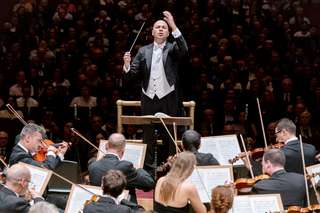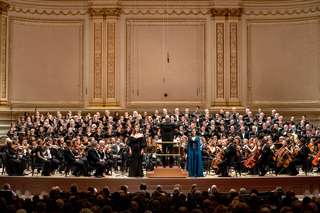|
Back
The Glory that (could be) Greece New York
Stern Auditorium, Carnegie Hall
10/10/2019 -
Michael Hadjiloizou: Interlude Act II from 9th of July 1821: “The Song of Kiprianos” (American premiere)
Yiannis Hadjiloizou:Cyprus Dance No. 1 “Servicus” (American Premiere)
Gustav Mahler: Symphony No. 2 in C Minor “Resurrection”
Larisa Martínez (Soprano), Daveda Karanas (Mezzo-soprano)
New York Choral Society, David Hayes (Music Director), Athens Philharmonic, Yiannis Hadjiloizou (Artistic Director, Music Director, Conductor)
“Geometry comes from strings humming. Music comes from the spacing of the spheres.”
Pythagoras (Circa 569-475 BCE)
“Everything flows and nothing abides, everything gives way and nothing stays fixed.”
Heraclitus (Circa 535-475 BCE)

Y. Hadjiloizou last night (© Fadi Kheir)
If the Athens Philharmonic wasn’t perfect in their New York premiere last night, blame, they were easily absolved. First, they selected as their main work one of the most Promethean pieces in the repertory. And second (this was the big one), orchestra has been in existence for less than one year.
Whether this was chutzpah or hubris or audacity, that is worthy of praise.
Then again, the glories of Greece in the three-thousand years since Orpheus brings us to a world all its own. Dmitri Mitropoulos was one of the most powerful conductors ever to grace the dais of the New York Philharmonic. Iannis Xenakis was a quantum (and political) revolutionary who turned cosmic equations into notes. Mikis Theodorakis is far more than an ex-Zorba-itant composer. His works are still stunning as are many other composers from present-day Greece.
Yiannis Hadjiloizou, actually from the Greek division of Cyprus, where he founded several orchestras, is in that tradition. As a composer, he and his father Michael Hadjiloizou had two of their works peformed before the Mahler, and they aurally stunning.
Hadjiloizou père was represented with a short excerpt from his opera, 9th of July, 1821, the date of the Greek revolution against their Ottoman overseers. Although it included a hymn or two (hey, God loves wars), this was a jaunty work, starting with dancing repetitions, ending with the same Balkan legerdemain. Yiannis was equally in that vein. It could have been early Bartók, or–far more likely–the Enescu of the two Rhapsodies, but it was all Greek. They were two short (and too short) works with no pretenses, gorgeous orchestration, a delight to start the evening.
(Equally delightful was that, unlike most of these visiting orchestra, we had no boring opening speeches, no national anthems, no deadening introductions. Mr. Hadjiloizou walked on stage, lifted the baton, and off we went! No applause between movements, no coughing, a splendid atmosphere.)
Obviously the Mahler Second Symphony was not going to have the universal grandeur of a Vienna or New York or Berlin Philharmonic. But the Athens Phil performance had quite a few assets,, first their conductor Mr. Hadjiloizou. He is a magisterial figure, holds his long baton with authority, knows his orchestra well, and has the experience to hold them in check.

Full ensemble last night (© Fadi Kheir)
The huge ensemble itself has some superb first-chair players in the winds and brass, great percussion. Unlike their Central European colleagues, the Athens Phil has almost 50 percent women, including a terrific percussionist.
Granted, those gargantuan forces lacked anything near the clarity demanded in the Mahler. No problems with any of the consorts. But not even Mr. Hadjiloizou could prevent auditory smearing in the grand chorales. Nor could he actually lift the orchestra to a dance-like ländler in the second movement. This was Mahler at his happiest, and one would have liked more of the lilt and spontaneity which Mr. Hadjiloizou gave to the dances which premiered the evening.
The true glories came, inevitably in the last two movements. Mezzo-soprano Daveda Karanas walked on stage carrying a rose, in honor of the first line from her aria. But she needed no flowers, for her voice blossomed out of the orchestra and bloomed through the night. Lovely, underplayed, dramatic at the right moments. Soprano Larisa Martínez joined her in those High Romantic passages in the finale with an equally splendid operatic voice.
As usual, the New York Choral Society stole the show. That isn’t exactly right. Were a North Dakota kindergarten chorus and orchestra played the final five minutes of the Mahler, they would succeed too, for this was pure build-up of feelings in the best sense. Not nuanced Mahler, not mystical Mahler, but the Mahler from those precursors to the Greek gods, the Titans themselves.
I have no idea whether the orchestra gave an encore, but I walked out after the Mahler. Nothing can top that last movement. Mr. Hadjiloizou and his young orchestra gave it all the necessary mightiness it deserved.
Harry Rolnick
|